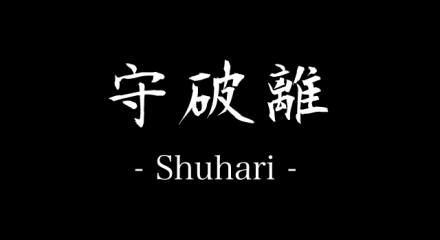The word Shuhari is originally a Japanese martial arts concept from Bushido that describes the stages leading to mastery in a given discipline, but it can also be applied in other fields and situations, such as the entertainment sector or in business. Let’s break it down.

守破離
しゅはり
The 3 stages of learning that lead to mastery
The word might look rather daunting, but it’s really quite simple when you take it apart. Just consider each kanji alone to get the idea.
守
This kanji has the meaning of ‘protect’ or ‘preserve’ and is most easily remembered with the verb 守る (まもる) – to protect. This part of Shuhari refers to ‘preserving the fundamentals’ of whatever discipline you are studying. Our first step to mastery then is found in respecting tradition and absorbing existing knowledge and practices. We don’t question our teacher or their methods, but instead heed their advice and do as instructed. Here’s a good summary in Japanese:
最初の段階では、指導者の話を守る。できるだけ多くの話を聞き、指導者の行動を見習って、指導者の価値観を自分のものにしていく。すべてを習得できたと感じるまでは、指導者の指導の通りの行動する。
破
The central part of Shuhari means ‘break’ or ‘detach’ and makes up the word 破る (やぶる) – to break. You may also remember the kanji from the word 破壊 (はかい) which means ‘destruction’. Here we begin to break away from tradition, trying out new things and our own original techniques. In Japanese:
次の段階で、指導者の話を守るだけではなく、破る行為をしてみる。自分独自に工夫して、指導者の話になかった方法を試してみる。
離
The last character, most commonly found in the word 離れる (はなれる) – to depart or separate. Also in the word 離す (はなす) – to release (something or someone). We are moving away from our instructor and forwards to forge our own path.
最後の段階では、指導者のもとから離れて、自分自身で学んだ内容をさらに発展させる。もっと分かり易く言うと、まず、マネをして、次の自分のオリジナルを混ぜてみて、最後に、新しいものをつくっていくということですね。
So the whole process amounts to first obeying the rules and copying, then breaking the rules and adding our own original touch, and finally creating our own rules and inventing something new.
Pretty neat, no? As the word has its roots in martial arts, the philosophical nature of the characters should come as no surprise. But take a second to think about it, and pretty much every discipline adheres to this process in some way or another. Fashion? Copy someone you think is cool, add your own touch, settle with a fashion sense unique to you. Business? Learn the ropes, then add your input, and finally re-define your field. Learning Japanese? Study the fundamentals, try creating new sentences and expressions (and make mistakes), settle with your own unique way of using the language upon mastering it. (Of course – this isn’t an excuse to use broken Japanese! I’m talking about creative use of the language within its linguistic bounds.)
The concept of Shuhari is inherent in the way we grow and learn new things. Mastery involves not just expertly using the tools and techniques given to you, but in shaping and redefining them to push the entire genre forward. As my Philosophy teacher George MacDonald Ross once very eloquently put it:
When students ask me what they need to do for a first, I say ‘surprise me’. One way they can surprise me is by criticising my module materials — which is an infallible way of giving evidence that they are thinking for themselves, and not merely passively following what I teach them. If they are sceptical as to whether I am serious about rewarding criticism of me, I tell them that if I were teaching them the martial arts rather than philosophy, I would consider myself a failure as a teacher if my students could not throw me from time to time after three years of tuition. I also add that I wrote some of my commentaries a long time ago, and I may have changed my mind since then. This gives them more of a licence to criticise me, and some of the best essays my students have produced have in fact given a sustained argument against my own interpretation of Kant. I can hardly ask for more than this as evidence of my students’ independent thinking, but I cannot help wondering how many other academics would mark their students up rather than down for disagreeing with them.
So don’t be afraid to break away and try something new and, once you’re ready, to define your own limits. Just make sure you learn those fundamentals first before you begin questioning them :).
Leave a Reply